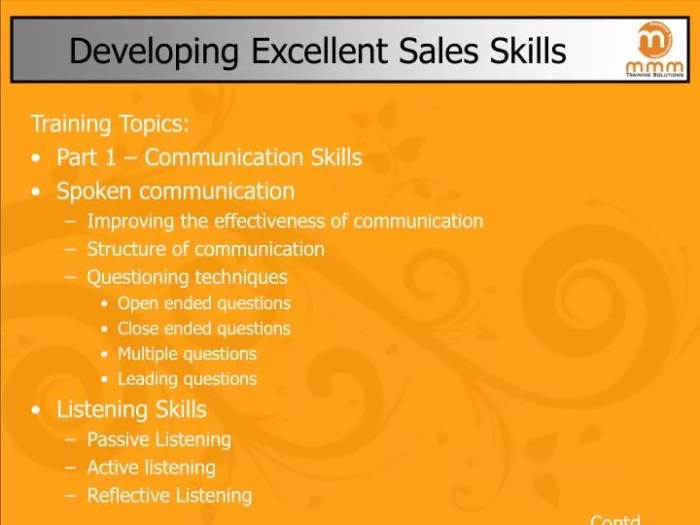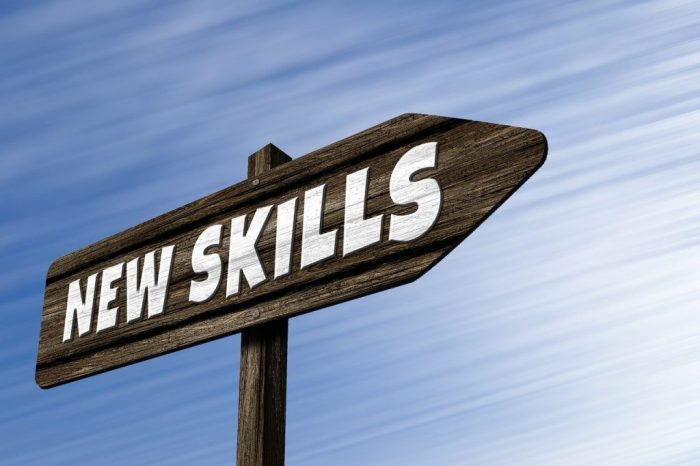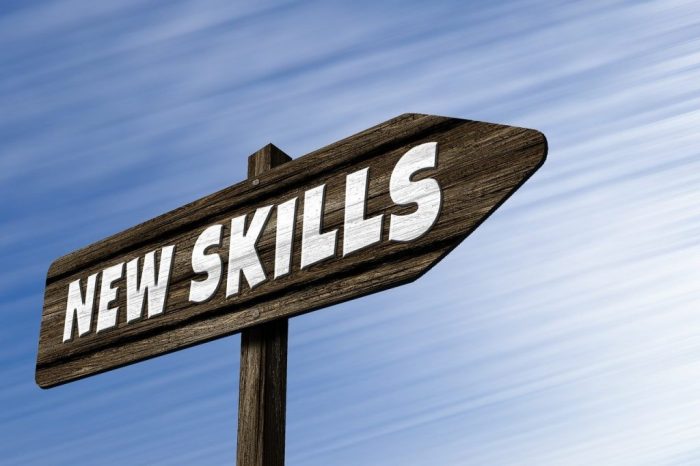Developing Sales Skills sets the stage for this enthralling narrative, offering readers a glimpse into a story that is rich in detail with american high school hip style and brimming with originality from the outset.
Are you ready to dive into the world of sales skills and unlock your full potential? Let’s explore the key aspects that can take your sales game to the next level.
Importance of Developing Sales Skills

In today’s competitive business environment, developing sales skills is crucial for the success of any company. Sales skills are not only about closing deals but also about understanding customer needs, building relationships, and ultimately driving revenue growth.
Increased Revenue and Business Growth
- Effective sales skills can lead to increased revenue by converting leads into paying customers.
- By understanding the sales process and mastering techniques like objection handling and negotiation, sales professionals can close more deals and boost the company’s bottom line.
- Furthermore, honing sales skills can help businesses expand their customer base and reach new markets, leading to overall business growth and success.
Building Strong Customer Relationships, Developing Sales Skills
- Developing sales skills is not just about making a sale; it’s also about building strong and lasting relationships with customers.
- By actively listening to customer needs, providing solutions, and offering exceptional service, sales professionals can earn the trust and loyalty of their clients.
- Strong customer relationships can result in repeat business, referrals, and positive word-of-mouth, all of which are essential for long-term success in sales.
Key Sales Skills to Develop: Developing Sales Skills

Developing key sales skills is crucial for success in the industry. These skills can make or break a deal and set you apart from the competition. Let’s take a look at some essential sales skills that every salesperson should work on honing.
Active Listening
Active listening is the art of fully concentrating, understanding, responding, and remembering what is being said in a conversation. It involves not only hearing the words but also understanding the emotions and intentions behind them. By actively listening to your customers, you can better address their needs and concerns, leading to more successful sales.
Negotiation
Negotiation skills are vital in sales as they allow you to reach mutually beneficial agreements with customers. Knowing how to effectively negotiate can help you close deals, resolve conflicts, and build strong relationships with clients. It involves finding common ground, understanding both parties’ needs, and reaching a compromise that satisfies everyone involved.
Objection Handling
Objection handling is the ability to address and overcome customer objections during the sales process. This skill requires quick thinking, empathy, and a thorough understanding of the product or service being offered. By effectively handling objections, you can alleviate customer concerns, build trust, and increase your chances of making a sale.
Soft Skills vs. Hard Sales Skills
Soft skills, such as empathy and communication, are just as important as hard sales skills like negotiation and objection handling. While hard skills are essential for closing deals and driving revenue, soft skills are crucial for building relationships, understanding customer needs, and providing excellent customer service. Finding the right balance between soft and hard skills is key to becoming a successful salesperson.
Real-Life Scenarios
In real-life sales scenarios, different sales skills come into play at various stages of the sales process. For example, active listening is crucial during the discovery phase when you’re trying to understand the customer’s needs. Negotiation skills are essential when discussing pricing and terms, while objection handling is necessary when addressing customer concerns or hesitations. By mastering these skills and knowing when to apply them, you can navigate the sales process effectively and close deals successfully.
Training and Development Programs
In today’s competitive sales landscape, continuous learning and development are essential to stay ahead of the game. Investing in training programs can significantly enhance sales skills and boost performance.
Benefits of Sales Workshops, Seminars, and Online Courses
- Interactive learning experiences: Workshops and seminars provide hands-on training and real-life scenarios to practice sales techniques.
- Networking opportunities: Attending these events allows you to connect with industry experts and fellow sales professionals, expanding your network.
- Access to expert knowledge: Online courses often feature top sales trainers who share their expertise and best practices for success.
- Flexible learning options: Online courses offer convenience and flexibility, allowing you to learn at your own pace and schedule.
Tips for Choosing the Right Sales Training Program
- Identify your skill gaps: Assess your current sales skills and determine areas where you need improvement.
- Research programs: Look for training programs that align with your specific skill development goals and learning preferences.
- Check reviews and testimonials: Before enrolling in a program, read reviews and testimonials from past participants to gauge the program’s effectiveness.
- Consider the format: Choose a training program that fits your learning style, whether it’s in-person workshops, virtual seminars, or self-paced online courses.
Role-Playing and Simulation Exercises
Role-playing and simulation exercises play a crucial role in developing sales skills by providing a hands-on approach to learning and honing essential techniques. These exercises help sales professionals overcome common challenges they may face in real-life sales situations, such as objections from customers or handling difficult interactions.
Sample Role-Playing Scenario: Objection Handling
In this role-playing scenario, one participant acts as a salesperson trying to sell a new software product to a potential customer, while the other participant takes on the role of the customer who raises objections about the product’s price. The salesperson must then effectively address these objections by highlighting the software’s unique features, benefits, and value proposition to convince the customer of its worth.
Simulation Exercises for Customer Interactions
Simulation exercises are valuable tools for sales professionals to practice and refine their skills in a controlled environment. These exercises can involve simulated sales calls, meetings, or negotiations with different types of customers, each presenting unique challenges and opportunities. By engaging in these simulations, sales professionals can improve their ability to adapt to various customer personalities, objections, and selling scenarios, ultimately enhancing their overall sales performance.
